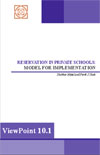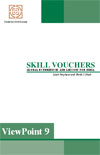| Research |
Vouchers for Basic Education in Developing Countries - A Principal-Agent Perspective
Authors: Varun Gauri and Ayesha Vawda
The World Bank, March 2003
Abstract: Voucher programs consist of three simultaneous reforms: 1) allowing parents to choose schools, 2) creating intense incentives for schools to increase enrollment, and 3) granting schools management autonomy to respond to demand. As a result, voucher advocates and critics tend to talk past each other. A principal-agent framework clarifies the argument for education vouchers. Central findings from the literature, including issues related to variance in the performance measure, risk aversion, the productivity of more effort, multiple tasks, and the value of monitoring are found relevant for an analysis of vouchers. An assessment of findings on voucher programs in industrial countries, as well as a review of voucher or quasi-voucher experiences in Bangladesh, Chile, Colombia, Cote d'Ivoire, and the Czech Republic support the usefulness of the analytic framework. Gauri and Vawda conclude that vouchers for basic education in developing countries can enhance outcomes when they are limited to modest numbers of poor students in urban settings, particularly in conjunction with existing private schools with surplus capacity. The success of more ambitious voucher programs depends on an institutional infrastructure challenging to industrial and developing countries alike.
... read more |
| Education News |
| |
The kidnapped Nigerian girls show that religious conservatives hate education
- The Guardian, 2 May 2014
No girl should be a hero for getting an education. But for many girls around the world, walking through the schoolhouse doors isn't a right or an assumption: it's a victory over conservative fanatics – some of whom carry guns. |
India’s ‘Other MIT’ Scores Again, Brings Country’s Private Engineering Schools Into Force
- Forbes, 30 Apr 2014
When two India-born (both in 1967), India-educated executives were recently named CEOs of two large multinational corporations, it caused quite an eruption in a country where such global appointments are not exactly commonplace. Even more unusual is the fact that both men were educated at a small university town near Bangalore called Manipal on India’s south-western coast. |
Innovative school design to reinvent education
- The Times of India, 5 May 2014
NEW DELHI: Factory-like school buildings are out; "learning environments" are in. In a recent talk on "Global Shifts in Education," organised by Education Design Architects, architect and planner Prakash Nair spoke on new ways of designing schools that'll be in step with how learning actually happens. |
Maharashtra education department ropes in British Council, IIT
- The Times of India, 5 May 2014
PUNE: The state education department has launched four skill enhancement courses for school teachers in English language, maths, science and learning outcomes. The first batch of English language teachers was trained last year while training of other teachers would be undertaken soon. |
India’s quality of higher education must match enrolment (Comment: Active Voice)
- Business Standard, 28 April 2014
India has the third largest education system in the world. This in itself is a remarkable achievement. But the severity of challenges that the system faces is exceedingly high, daunting, and at times looks insurmountable. The challenges confronting the Indian higher education system are also challenging, complex and have different hues. |
Education vouchers are filling private schools
- Indy Star, 4 May 2014
FORT WAYNE — Private schools across Indiana are nearing capacity under the state's 3-year-old voucher program, and the space crunch could force lawmakers to consider providing money to expand buildings. |
|
|
|
Poll
What should be the criteria for granting recognition status to schools?
To vote click here.
|
|
|
Factoid
The percentage of six to 14 year olds enrolled in private schools in rural India has increased from 19 to 29 percent between 2006 and 2013. Source: Human Rights Watch
|
|
Publications
 
|
| |
|
|


